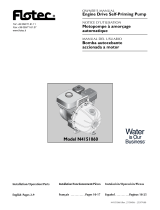
Emission Control System Information
wc_tx000239gb.fm 12
THINGS YOU SHOULD KNOW ABOUT THE EMISSION CONTROL
SYSTEM WARRANTY:
MAINTENANCE AND REPAIRS
You are responsible for the proper maintenance of the engine. You
should keep all receipts and maintenance records covering the
performance of regular maintenance in the event questions arise.
These receipts and maintenance records should be transferred to
each subsequent owner of the engine. Wacker reserves the right to
deny warranty coverage if the engine has not been properly
maintained. Warranty claims will not be denied, however, solely
because of the lack of required maintenance or failure to keep
maintenance records.
MAINTENANCE, REPLACEMENT OR REPAIR OF EMISSION
CONTROL DEVICES AND SYSTEMS MAY BE PERFORMED BY
ANY REPAIR ESTABLISHMENT OR INDIVIDUAL; HOWEVER,
WARRANTY REPAIRS MUST BE PERFORMED BY A SERVICE
DEALER AUTHORIZED BY WACKER. THE USE OF PARTS THAT
ARE NOT EQUIVALENT IN PERFORMANCE AND DURABILITY TO
AUTHORIZED PARTS MAY IMPAIR THE EFFECTIVENESS OF THE
EMISSION CONTROL SYSTEM AND MAY HAVE A BEARING ON
THE OUTCOME OF A WARRANTY CLAIM.
If other than the parts authorized by Wacker are used for maintenance
replacements or for the repair of components affecting emission
control, you should assure yourself that such parts are warranted by
their manufacturer to be equivalent to the parts authorized by Wacker
in their performance and durability.
HOW TO MAKE A CLAIM
All repair qualifying under this limited warranty must be performed by
a service dealer authorized by Wacker. In the event that any emission-
related part is found to be defective during the warranty period, you
shall notify WACKER CORPORATION Product Support Department
(U.S.A. 1-800-770-0957, Canada 1-877-977-0775) and you will be
advised of the appropriate warranty service dealer or service providers
where the warranty repair can be performed.
CALIFORNIA EMISSION CONTROL WARRANTY STATEMENT
YOUR WARRANTY RIGHTS AND OBLIGATIONS
The California Air Resources Board and Wacker Corporation (herein
“Wacker”) are pleased to explain the emissions control system
warranty on your small off-road engine. In California, new small off-
road engines must be designed, built and equipped to meet the State's
stringent anti-smog standards. Wacker Corporation must warrant the
emissions control system on your engine for the periods of time listed
below provided there has been no abuse, neglect or improper
maintenance of your engine.





















